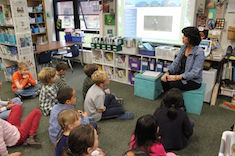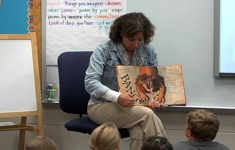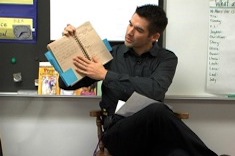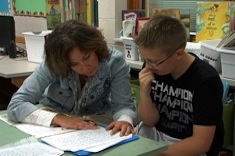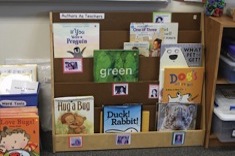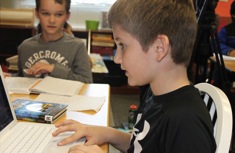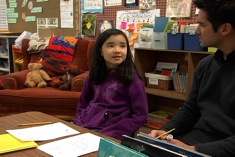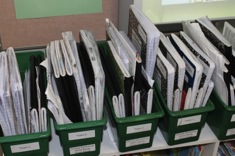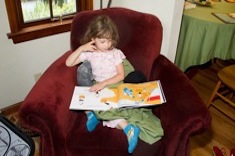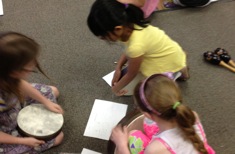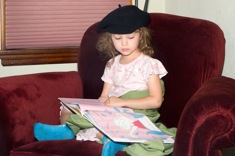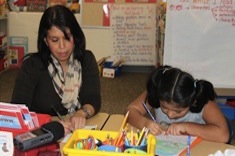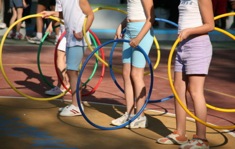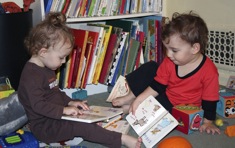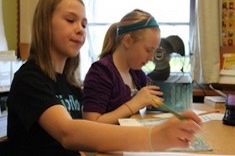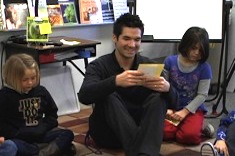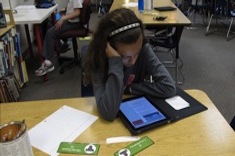2nd
Latest Content
Keep Going
Ruth Ayres has advice for moving forward, staying positive, and focusing on what’s important.
A Closer Look at Engagement
Are the terms stamina and engagement synonymous? Cathy Mere defines the terms by observing her first graders.
Spelling Cycles: An Alternative to Weekly Spelling Lists
Max Brand developed Spelling Cycles as an alternative to weekly spelling tests. He explains how they work with an example from a third-grade class.
Second-Grade Minilesson on Capital Letters
Ruth Ayres presents a minilesson on capital letters to a second-grade class.
Finding Topics in Writer’s Notebooks Minilesson
Sean Moore shares the importance of using a writer’s notebook to discover topics in this minilesson with his second-grade students from early in the year.
Powerful Conferences
Ruth Ayres explains how deciding the purpose of conferring in advance can lead to more powerful conferences.
Holding Thinking Minilesson with Second Graders
Deb Gaby uses an analogy of animal tracks to introduce the concept of "holding thinking" in reading journals to second graders.
Mentor Texts for “Versus” Stories
Shark vs. Train! Fork vs. Spoon! Versus stories are incredibly popular in writing workshops these days. Cathy Mere found herself struggling to teach narrative conventions to students writing versus tales, so she created a booklist of mentor texts.
Keeping Kids Safe on the Internet
Julie Johnson provides helpful tips and a letter for parents to help keep students safe on the Internet.
Mentor Texts for Writing Endings
One goal of many primary teachers is to help students finish their drafts with an ending other than “The End” (or “they lived happily ever after”). Katie DiCesare shows her first graders many alternative examples, and she begins early in the year.
Using Pinterest for Professional Development
Franki Sibberson finds Pinterest is a useful tool for professional development.
Using Technology to Connect Young Readers and Writers
Julie Johnson reflects on how technology is changing her own reading community, and builds on this knowledge to connect readers and writers in her classroom with others through the Internet.
Building from Strengths: Conferring with Mia
Sean Moore confers with second grader Mia, gently encouraging her to work from her strengths by writing about what she knows well.
Daily Routines: Finding Time for What Matters
Ann Marie Corgill provides some guiding questions to help teachers figure out priorities in their schedules for daily routines.
Routines to Build Independence Early in the School Year
Katie DiCesare explores how to develop routines early in the year, and includes advice to give to parents to build the home/school connection around expectations for independence.
Grateful Journals
Beth Lawson began her own gratitude journal as a troubled teen, and finds that the daily routine of Grateful Journals is a powerful tool for reflection and building community in the intermediate grades.
Recommendations for Summer Reading Fun: Comics and Graphic Novels for Early Readers
Early readers love comic books and graphic novels. Meghan Rose and Ruth Shagoury give their top picks in their latest summer fun for early readers booklist.
Literacy in the Music Room: A Sequence of Lessons
Jennifer Schwanke describes the work of a music teacher who integrates literacy learning into her curriculum.
Recommendations for Summer Reading Fun: Classic Books for Early Readers
Meghan Rose and Ruth Shagoury have written a series of booklists for early readers, perfect for sharing with parents looking for suggestions. The first installment tackles the classic books many of us cherish from our own childhood days.
Staying Connected with Students All Summer Long
Cathy Mere explains how she uses technology to stay in touch with students and families over the summer.
Death in Books: Finding Our Way After Loss
Books can help children deal with the toughest challenges in life. In a new booklist, Andie Cunningham shares her top picks for stories about characters grappling with the death of a loved one.
Rehearsing Informational Writing: Conferring with Jocelyn
Stella Villalba confers with first grader Jocelyn about the information text she is writing about bunnies. Jocelyn is an English language learner, and this conference demonstrates the value of oral rehearsal for young ELL writers.
Understanding the Middle East Through Children’s Literature (BOOKLIST)
Sheiks, harems, and terrorists — the stereotypes of the middle east from popular culture may not be realistic, but they sure are pervasive. Ruth Shagoury and Andie Cunningham find authentic alternative views to present to children in their new booklist.
Research IS the Project (Primary Research Series)
Heather Rader blurs the line between research and presentation in the final installment of the primary research series.
Embracing the Growth Mindset with Audiobooks
Jennifer Vincent explains how recorded texts were a potent tool for reaching a struggling fourth-grade reader.
A Literary Taste of Home (Home is Where the Books Are Series)
Meghan Rose may live in Los Angeles, but the home of her heart will always be New England. In this booklist, she shares her favorite picture books about everything from the Red Sox to Maine blueberries to give her children a sense of where she grew up.
KLWL: Ordering Research (Primary Research Series Part 3)
Heather Rader looks at the importance of frontloading information for young learners in the third installment of the primary research series.
The “Tys” of Student Research: Safety and Credibility (Primary Research Series Part 2)
Heather Rader shares the second installment in our primary research series.
Poetry and Fluency Minilesson in Second Grade
Sean Moore uses the poem “The Busy Ant” for partner work and discussion of fluency and vocabulary with his second graders.
Putting the Search Back in Research
Heather Rader launches a new four-part series on teaching research skills in the primary grades. This first installment highlights search techniques for children.
Browse Content By
Type
Category
- Assessment Tools
- Big Fresh Archives
- Booklists
- Choice Numeracy
- Classroom Design
- Common Core
- Community Building
- Conferring
- Content Literacy
- Digital Literacy
- English Language Learners
- Equity
- Family Relations
- Free Samples
- Guiding Groups
- Leadership
- Literacy Coaches
- Mentor Texts
- Minilessons
- New Teacher Mentors
- Podcasts
- Poetry
- Quote Collections
- Reading Strategies
- Self Care
- Struggling and Striving Learners
- Talking and Listening
- Teacher Study Groups
- Teaching Reading
- Teaching Writing
- Word Study and Vocabulary
Author
- Melissa Quimby
- Nawal Qarooni
- Gwen Blumberg
- Julie Cox
- The Lead Learners
- Hannah Tills
- Josie Stewart
- Ruth Metcalfe
- Mallory Messenger
- Becca Burk
- Jodie Bailey
- Vivian Chen
- Mary Brower
- Tiffany Abbott Fuller
- Stephanie Affinito
- Ruth Ayres
- Leigh Anne Eck
- Heather Fisher
- Shari Frost
- Julie Johnson
- Suzy Kaback
- Gigi McAllister
- Shirl McPhillips
- Melanie Meehan
- Cathy Mere
- Debbie Miller
- Tara Barnett and Kate Mills
- Tammy Mulligan
- Dana Murphy
- Bitsy Parks
- David Pittman
- Brenda Power
- Heather Rader
- Matt Renwick
- Mandy Robek
- Christy Rush-Levine
- Gretchen Schroeder
- Jen Schwanke
- Brian Sepe
- Katherine Sokolowski
- Stella Villalba
- Jennifer Vincent
Grade Level
Choice Literacy Membership
Articles
Get full access to all Choice Literacy article content
Videos
Get full access to all Choice Literacy video content
Courses
Access Choice Literacy course curriculum and training


